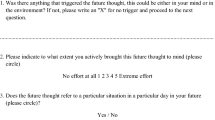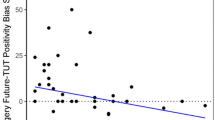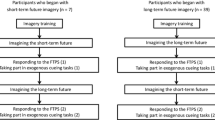Abstract
Optimism is known to buffer against negative mood. Thus, understanding the factors that contribute to individual variation in optimism may inform interventions for mood disorders. Preliminary evidence suggests that the generation of mental imagery-based representations of positive relative to negative future scenarios is related to optimism. This study investigated the hypothesis that an elevated tendency to generate positive relative to negative mental imagery during spontaneous future thinking would be associated with reduced negative mood via its relationship to higher optimism. Participants (N = 44) with varied levels of naturally occurring negative mood reported current levels of optimism and the real-time occurrence and characteristics of spontaneous thoughts during a sustained attention computer task. Consistent with hypotheses, higher optimism statistically mediated the relationship between a higher proportional frequency of positive relative to negative mental imagery during spontaneous future thinking and lower negative mood. Further, the relationship between emotional mental imagery and optimism was found for future, but not past, thinking, nor for verbal future or past thinking. Thus, a greater tendency to generate positive rather than negative imagery-based mental representations when spontaneously thinking about the future may influence how optimistic one feels, which in turn may influence one’s experience of negative mood.

Similar content being viewed by others
Availability of data and material
Data for this manuscript can be viewed via the Open Science Framework at: https://osf.io/x3h7t/?view_only=590ee853c8c64821ac4bc3215adcf784.
References
Abramson, L. Y., Metalsky, G. I., & Alloy, L. B. (1989). Hopelessness depression: A theory-based subtype of depression. Psychological Review, 96, 358–372. https://doi.org/10.1037/0033-295X.96.2.358
Andrews-Hanna, J., Kaiser, R., Turner, A., Reineberg, A., Godinez, D., Dimidjian, S., & Banich, M. (2013). A penny for your thoughts: Dimensions of self-generated thought content and relationships with individual differences in emotional wellbeing. Frontiers in Psychology, 4, 900. https://doi.org/10.3389/fpsyg.2013.00900
Baumeister, R. F. (1990). Suicide as escape from self. Psychological Review, 97(1), 90.
Beaty, R. E., Seli, P., & Schacter, D. L. (2018). Thinking about the past and future in daily life: An experience sampling study of individual differences in mental time travel. Psychological Research Psychologische Forschung. https://doi.org/10.1007/s00426-018-1075-7
Beck, A. T., Riskind, J. H., Brown, G., & Steer, R. A. (1988). Levels of hopelessness in DSM-III disorders: A partial test of content specificity in depression. Cognitive Therapy and Research, 12(5), 459–469. https://doi.org/10.1007/BF01173413
Beck, A. T., Rush, A. J., Shaw, B. F., & Emery, G. (1979). Cognitive therapy of depression. Guilford.
Beck, R., Perkins, T. S., Holder, R., Robbins, M., Gray, M., & Allison, S. H. (2001). The cognitive and emotional phenomenology of depression and anxiety: Are worry and hopelessness the cognitive correlates of NA and PA? Cognitive Therapy and Research, 25(6), 829–838.
Benoit, R. G., Paulus, P. C., & Schacter, D. L. (2019). Forming attitudes via neural activity supporting affective episodic simulations. Nature Communications, 10(1), 2215. https://doi.org/10.1038/s41467-019-09961-w
Berntsen, D. (2019). Spontaneous future cognitions: An integrative review. Psychological Research Psychologische Forschung, 83(4), 651–665. https://doi.org/10.1007/s00426-018-1127-z
Blackwell, S. E., Dooley, D., Würtz, F., Woud, M. L., & Margraf, J. (2020). Inducing positive involuntary mental imagery in everyday life: An experimental investigation. Memory, 28(9), 1157–1172. https://doi.org/10.1080/09658211.2020.1822413
Blackwell, S. E., Rius-Ottenheim, N., Schulte-van Maaren, Y. W. M., Carlier, I. V. E., Middelkoop, V. D., Zitman, F. G., & Giltay, E. J. (2013). Optimism and mental imagery: A possible cognitive marker to promote well-being? Psychiatry Research, 206(1), 56–61.
Bradley, M. M., & Lang, P. J. (1999). Affective norms for English words (ANEW): Instruction manual and affective ratings. The Center for Research in Psychophysiology.
Brown, G. P., Macleod, A. K., Tata, P., & Goddard, L. (2002). Worry and the simulation of future outcomes. Anxiety, Stress & Coping, 15(1), 1–17.
Brydon, L., Walker, C., Wawrzyniak, A. J., Chart, H., & Steptoe, A. (2009). Dispositional optimism and stress-induced changes in immunity and negative mood. Brain, Behavior, and Immunity, 23(6), 810–816.
Bulley, A., Redshaw, J., & Suddendorf, T. (2019). The future-directed functions of the imagination: From prediction to metaforesight. Cambridge University Press.
Carver, C. S., & Gaines, J. G. (1987). Optimism, pessimism, and postpartum depression. Cognitive Therapy and Research, 11(4), 449–462.
Carver, C. S., Scheier, M. F., & Segerstrom, S. C. (2010). Optimism. Clinical Psychology Review, 30(7), 879–889. https://doi.org/10.1016/j.cpr.2010.01.006
Chopik, W. J., Oh, J., Kim, E. S., Schwaba, T., Krämer, M. D., Richter, D., & Smith, J. (2020). Changes in optimism and pessimism in response to life events: Evidence from three large panel studies. Journal of Research in Personality, 88, 103985. https://doi.org/10.1016/j.jrp.2020.103985
D’Argembeau, A., & Van der Linden, M. (2007). Emotional aspects of mental time travel. Behavioral and Brain Sciences, 30(3), 320–321.
De Brigard, F., Szpunar, K. K., & Schacter, D. L. (2013). Coming to grips with the past: Effect of repeated simulation on the perceived plausibility of episodic counterfactual thoughts. Psychological Science, 24(7), 1329–1334. https://doi.org/10.1177/0956797612468163
Dunn, B. D. (2012). Helping depressed clients reconnect to positive emotion experience: Current insights and future directions. Clinical Psychology & Psychotherapy, 19(4), 326–340. https://doi.org/10.1002/cpp.1799
Fritz, M. S., & Mackinnon, D. P. (2010). Power analysis for mediation studies. Psychological Science, 18(3), 233–239. https://doi.org/10.1111/j.1467-9280.2007.01882.x.Required
Gamble, B., Moreau, D., Tippett, L. J., & Addis, D. R. (2019). Specificity of future thinking in depression: A meta-analysis. Perspectives on Psychological Science, 14(5), 816–834. https://doi.org/10.1177/1745691619851784
Giambra, L. M. (1977). A factor analytic study of daydreaming, imaginal process, and temperament: A replication on an adult male life-span sample 1. Journal of Gerontology, 32(6), 675–680. https://doi.org/10.1093/geronj/32.6.675
Giambra, L. M. (1993). The influence of aging on spontaneous shifts of attention from external stimuli to the contents of consciousness. Experimental Gerontology, 28(4), 485–492. https://doi.org/10.1016/0531-5565(93)90073-M
Guesdon, A., Lejeune, F. X., Rotgé, J. Y., George, N., & Fossati, P. (2020). Mind-wandering changes in dysphoria. Frontiers in Psychiatry, 11, 1–8. https://doi.org/10.3389/fpsyt.2020.544999
Holmes, E. A., Blackwell, S. E., Burnett Heyes, S., Renner, F., & Raes, F. (2016). Mental imagery in depression: Phenomenology, potential mechanisms, and treatment implications. Annual Review of Clinical Psychology, 12(1), 249–280. https://doi.org/10.1146/annurev-clinpsy-021815-092925
Holmes, E. A., & Mathews, A. (2005). Mental imagery and emotion: A special relationship? Emotion, 5, 489–497. https://doi.org/10.1037/1528-3542.5.4.489
Ji, J. L., Heyes, S. B., MacLeod, C., & Holmes, E. A. (2016). Emotional mental imagery as simulation of reality: Fear and beyond: A tribute to Peter Lang. Behavior Therapy, 47(5), 702–719. https://doi.org/10.1016/j.beth.2015.11.004
Ji, J. L., Holmes, E. A., & Blackwell, S. E. (2017). Seeing light at the end of the tunnel: Positive prospective mental imagery and optimism in depression. Psychiatry Research, 247, 155–162. https://doi.org/10.1016/j.psychres.2016.11.025
Ji, J. L., Holmes, E. A., MacLeod, C., & Murphy, F. C. (2018). Spontaneous cognition in dysphoria: Reduced positive bias in imagining the future. Psychological Research Psychologische Forschung. https://doi.org/10.1007/s00426-018-1071-y
Jing, H. G., Madore, K. P., & Schacter, D. L. (2017). Preparing for what might happen: An episodic specificity induction impacts the generation of alternative future events. Cognition, 169, 118–128. https://doi.org/10.1016/j.cognition.2017.08.010
Lang, P. J. (1979). A bio-informational theory of emotional imagery. Psychophysiology, 16(6), 495–512. https://doi.org/10.1111/j.1469-8986.1979.tb01511.x
LeMoult, J., & Gotlib, I. H. (2019). Depression: A cognitive perspective. Clinical Psychology Review, 69, 51–66. https://doi.org/10.1016/j.cpr.2018.06.008
MacLeod, A. K. (2016). Prospection, well-being and memory. Memory Studies, 9(3), 266–274. https://doi.org/10.1177/1750698016645233
Meevissen, Y. M. C., Peters, M. L., & Alberts, H. J. E. M. (2011). Become more optimistic by imagining a best possible self: Effects of a 2 week intervention. Journal of Behavior Therapy and Experimental Psychiatry, 42(3), 371–378. https://doi.org/10.1016/j.jbtep.2011.02.012
Miloyan, B., Bulley, A., & Suddendorf, T. (2016). Episodic foresight and anxiety: Proximate and ultimate perspectives. British Journal of Clinical Psychology, 55(1), 4–22. https://doi.org/10.1111/bjc.12080
Miranda, R., & Mennin, D. S. (2007). Depression, generalized anxiety disorder, and certainty in pessimistic predictions about the future. Cognitive Therapy and Research, 31(1), 71–82. https://doi.org/10.1007/s10608-006-9063-4
Moulton, S. T., & Kosslyn, S. M. (2009). Imagining predictions: Mental imagery as mental emulation. Philosophical Transactions of the Royal Society B: Biological Sciences. https://doi.org/10.1093/acprof:oso/9780195395518.003.0040
Muris, P., & Van Der Heiden, S. (2006). Anxiety, depression, and judgments about the probability of future negative and positive events in children. Journal of Anxiety Disorders, 20(2), 252–261. https://doi.org/10.1016/j.janxdis.2004.12.001
Pearson, J., Naselaris, T., Holmes, E. A., & Kosslyn, S. M. (2015). Mental imagery: Functional mechanisms and clinical applications. Trends in Cognitive Sciences, 19(10), 590–602. https://doi.org/10.1016/j.tics.2015.08.003
Peters, M. L., Flink, I. K., Boersma, K., & Linton, S. J. (2010). Manipulating optimism: Can imagining a best possible self be used to increase positive future expectancies? The Journal of Positive Psychology, 5(3), 204–211.
Pile, V., & Lau, J. Y. F. (2018). Looking forward to the future: Impoverished vividness for positive prospective events characterises low mood in adolescence. Journal of Affective Disorders, 238, 269–276. https://doi.org/10.1016/j.jad.2018.05.032
Pile, V., Smith, P., Leamy, M., Oliver, A., Blackwell, S. E., Meiser-Stedman, R., & Lau, J. (2020). Harnessing mental imagery and enhancing memory specificity: Developing a brief early intervention for adolescent depression. Cognitive Therapy and Research. https://doi.org/10.1007/s10608-020-10130-3
Plimpton, B., Patel, P., & Kvavilashvili, L. (2015). Role of triggers and dysphoria in mind-wandering about past, present and future: A laboratory study. Consciousness and Cognition, 33, 261–276. https://doi.org/10.1016/j.concog.2015.01.014
Pyszczynski, T., Holt, K., & Greenberg, J. (1987). Depression, self-focused attention, and expectancies for positive and negative future life events for self and others. Journal of Personality and Social Psychology, 52(5), 994.
Roepke, A. M., & Seligman, M. E. P. (2016). Depression and prospection. British Journal of Clinical Psychology, 55(1), 23–48. https://doi.org/10.1111/bjc.12087
Schacter, D. L., Benoit, R. G., De Brigard, F., & Szpunar, K. K. (2015). Episodic future thinking and episodic counterfactual thinking: Intersections between memory and decisions. Neurobiology of Learning and Memory, 117, 14–21.
Schacter, D. L., Benoit, R. G., & Szpunar, K. K. (2017). Episodic future thinking: Mechanisms and functions. Current Opinion in Behavioral Sciences, 17, 41–50. https://doi.org/10.1016/j.cobeha.2017.06.002
Scheier, M. F., & Carver, C. S. (1985). Optimism, coping, and health: Assessment and implications of generalized outcome expectancies. Health Psychology, 4(3), 219.
Schooler, J. W. (2002). Re-representing consciousness: dissociations between experience and meta-consciousness. Trends in Cognitive Sciences, 6(8), 339–344. https://doi.org/10.1016/S1364-6613(02)01949-6
Segerstrom, S. C., Taylor, S. E., Kemeny, M. E., & Fahey, J. L. (1998). Optimism is associated with mood, coping, and immune change in response to stress. Journal of Personality and Social Psychology, 74(6), 1646–1655. https://doi.org/10.1037/0022-3514.74.6.1646
Sharot, T., Riccardi, A. M., Raio, C. M., & Phelps, E. A. (2007). Neural mechanisms mediating optimism bias. Nature, 450(7166), 102–105.
Singer, J. L., & Antrobus, J. S. (1972). Daydreaming, imaginal process and personality: A normative study. In P. W. Sheehan (Ed.), The function and nature of imagery (pp. 175–202). Academic Press.
Smallwood, J., Baracaia, S. F., Lowe, M., & Obonsawin, M. (2003). Task unrelated thought whilst encoding information. Consciousness and Cognition, 12(3), 452–484. https://doi.org/10.1016/S1053-8100(03)00018-7
Smallwood, J., & Schooler, J. W. (2015). The science of mind wandering: Empirically navigating the stream of consciousness. Annual Review of Psychology, 66(1), 487–518. https://doi.org/10.1146/annurev-psych-010814-015331
Strunk, D. R., Lopez, H., & DeRubeis, R. J. (2006). Depressive symptoms are associated with unrealistic negative predictions of future life events. Behaviour Research and Therapy, 44(6), 861–882.
Szpunar, K. K., & Schacter, D. L. (2013). Get real: Effects of repeated simulation and emotion on the perceived plausibility of future experiences. Journal of Experimental Psychology. General, 142(2), 323–327. https://doi.org/10.1037/a0028877
Taylor, S. E., Pham, L. B., Rivkin, I. D., & Armor, D. A. (1998). Harnessing the imagination. American Psychologist, 53(4), 429–439. https://doi.org/10.1037/0003-066X.53.4.429
Taylor, S. E., & Schneider, S. K. (1989). Coping and the simulation of events. Social Cognition, 7(2), 174–194. https://doi.org/10.1521/soco.1989.7.2.174
Vannucci, M., Pelagatti, C., & Marchetti, I. (2017). Manipulating cues in mind wandering: Verbal cues affect the frequency and the temporal focus of mind wandering. Consciousness and Cognition, 53, 61–69. https://doi.org/10.1016/j.concog.2017.06.004
Winer, E. S., & Salem, T. (2016). Reward devaluation: Dot-probe meta-analytic evidence of avoidance of positive information in depressed persons. Psychological Bulletin, 142(2), 367–402. https://doi.org/10.1146/annurev-immunol-032713-120240.Microglia
Funding
Julie L. Ji was supported by Cambridge Australia Scholarships in collaboration with the Cambridge Commonwealth, European and International Trust, and the Forrest Research Foundation. Fionnuala C. Murphy was supported by the UK Medical Research Council intramural programme SUAG/003/RG91365 and SUAG/049/G101400. Ben Grafton was supported by the Australian Research Council Grant DE200101570. Colin MacLeod was supported by Australian Research Council Grant DP170104533 and FL170100167. Emily A. Holmes was supported by the Medical Research Council (United Kingdom) intramural programme MC-A060-5PR50. Holmes reports Grants from The Lupina Foundation, The OAK Foundation (OCAY-18-442), The Swedish Research Council (2017-00957).
Author information
Authors and Affiliations
Contributions
JLJ: Conceptualization; Data curation; Formal analysis; Investigation; Methodology; Visualization; Writing—original draft; Writing—review and editing; FM: Conceptualization; Methodology; Supervision; Writing—review and editing; BG: Conceptualization; Methodology; Writing—review and editing; CM: Conceptualization; Methodology; Supervision; Writing—review and editing; EAH: Conceptualization; Funding acquisition; Methodology; Supervision; Writing—review and editing.
Corresponding author
Ethics declarations
Conflict of interest
The authors declare no conflicts of interest.
Additional information
Publisher's Note
Springer Nature remains neutral with regard to jurisdictional claims in published maps and institutional affiliations.
Rights and permissions
About this article
Cite this article
Ji, J.L., Murphy, F.C., Grafton, B. et al. Emotional mental imagery generation during spontaneous future thinking: relationship with optimism and negative mood. Psychological Research 86, 617–626 (2022). https://doi.org/10.1007/s00426-021-01501-w
Received:
Accepted:
Published:
Issue Date:
DOI: https://doi.org/10.1007/s00426-021-01501-w




